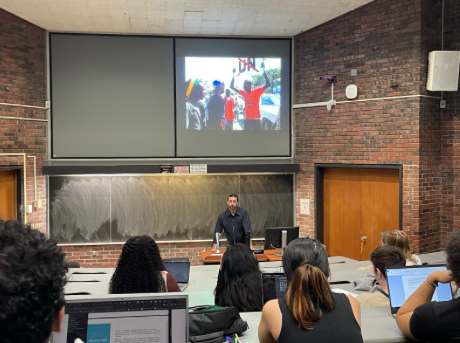
On March 14 in the Lecture Center, the Department of Sociology hosted Dr. Mark Schuller, a presidential research professor of anthropology at Northern Illinois University who has been conducting research in Haiti for 23 years. He came to speak about the current situation in Haiti and the role of the international community in the country. The event was co-sponsored by the Departments of anthropology and Black Studies, as well as the Program of Latin American, Caribbean and Latinx Studies.
Haiti is a sovereign state in the Caribbean, bordered to the east by the Dominican Republic. It has long been the subject of political instability and international intervention, especially by the US, France and Canada. It was founded in 1804 by self-emancipated African slaves of former French colony Saint-Domingue, but has struggled throughout its independent history for political and economic stability. This is due in part to the coerced payment of crippling debt to France, US occupation and multitudes of racist rhetoric and ideologies towards the nation over time.
On March 12, Haitian Prime Minister Ariel Henry announced he would resign once a transitional presidential council is created. This put a hold on Kenya’s plan to lead a UN-authorized multi-national police force in Haiti to help quell gang violence, as it had agreed to last October, despite the operation being ruled unconstitutional by Kenya’s top court. As of March 14, Kenyan President William Ruto has confirmed their commitment to still do this.
According to Schuller, Kenya was chosen to lead this effort because it is a proxy of the US and can act on its behalf without the political implications of direct involvement. Other governments have been reluctant to participate as well, due to concerns over the legitimacy of Henry’s government, which assumed power following the assassination of President Jovenel Moïse in 2021.
The discussion – titled Solidarity or Intervention? – spoke to the ongoing state of instability and uncertainty in Haiti based on Schuller’s research and experience as a faculty member at the State University of Haiti.
He took a keen focus on the framing of the country in global discussions, noting how the negative perceptions of it contribute to the perpetuation of crises.
“If you read media reports about Haiti, you’re gonna see words like tragic, ungovernable… It doesn’t take much to get them to just repeat the basis of afterimages of a media that is decidedly stacked against the world’s first free Black nation.”
Schuller described how the framing of paramilitaries as gangs contributes to a white supremacist narrative. These groups act as the controlling bodies that maintain authority and direct non-governmental organization (NGO) support in the absence of an effective government.
He criticized NGOs as “products of the neoliberal capitalist order,” explaining how they are private organizations which tend to “demobilize and depoliticize” the population, eviscerating the social safety net in favor of themselves. NGOs, rather than other means, are often used by the US and other nations to provide aid for Haiti. They are incentivized to portray themselves as saviors of a people who could not support themselves. This reproduces racist and degrading rhetoric towards Haiti and Haitians who live in other countries, such as the US.
To close, Schuller explained how the struggles of Haiti are interconnected with racial dehumanization in the US too.
“What’s happening in Haiti is happening elsewhere, it’s just easier to see because places like the US have layers of social brainwashing media to not see what’s going on.”
